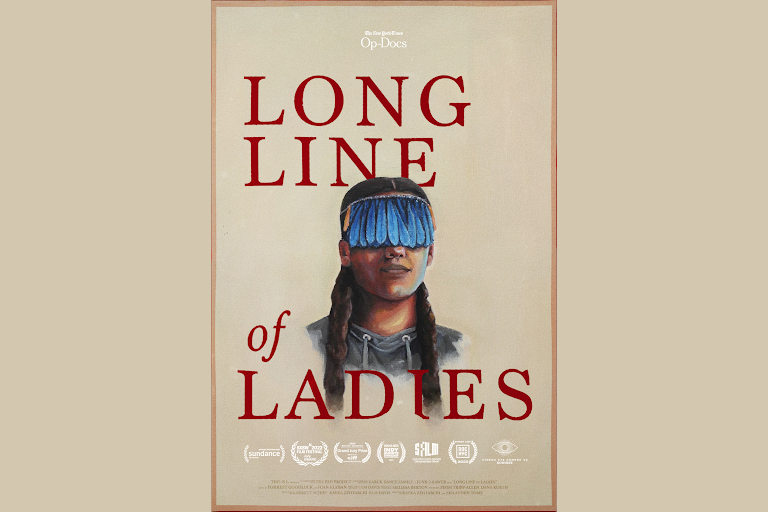
- Details
- By Odyssey Impact
You are invited to bring the award-winning film Long Line of Ladies to your community by hosting a film screening!
Made in association with The Pad Project, Long Line of Ladies (22 min) intimately observes the months-long process of one girl and her tight-knit Karuk community as they come together to prepare for her Ihuk, the coming-of-age ceremony for girls which went dormant for over 120 years due to the violence and destruction brought on by the Gold Rush. In the weeks leading up to her Ihuk, Ahty learns traditional dances and songs and mentally and physically prepares to spend four days blindfolded and fasting. Meanwhile, the women and men around her work tirelessly to pass down knowledge, prepare regalia, tools and food, and, above all, promote the continued revitalization of their traditions. Directed by Rayka Zehtabchi and Shaandiin Tome (Diné)
This powerful short film is free to screen and accessible to schools, community organizations, and houses of worship, through an Impact campaign led by Odyssey Impact. The film is also paired with resources in the form of a digitally accessed Screening Toolkit, which includes the following:
- Facilitators Guide
- Trauma-Informed Discussion Guide,
- Community Discussion Guide,
- Land Acknowledgment Resource Guide,
- Marketing Materials,
- Social Media Press Kit
The impact campaign for Long of Line of Ladies is designed to educate, engage, and activate Indigenous communities about the revitalization and reclamation of coming-of-age rituals and non-Indigenous communities about period and menstruation celebrations and Indigenous cultural, language, and land sovereignty. The impact campaign will also aim to spotlight the urgent need to recognize the importance of Indigeneity and positive masculinity. The film and resources will encourage community conversation on various topics, including the importance of community celebrations of women and girls.
As part of this campaign, we encourage you to use Long of Line of Ladies as a tool for training and/or teaching, guided by the campaign goals below:
Educate audiences on the history of the discrimination and suppression of the Karuk and other Indigenous communities by state and federal entities, the ongoing impact of settler colonialism and exploitation and in spite of that Indigenous resistance and resilience.
Celebrate and uplift the voices of Indigenous girls and women and the men who support them as they do the work of reclaiming cultural practices.
Encourage a safe and healthy dialogue between youth that destigmatizes young girls and periods.
Encourage audiences to recognize the sacredness and uniqueness of specific cultural practices, cultural humility, and how they can use this film to reclaim or create their own.
Spotlight the urgent need for non-Indigenous audiences to support local and national calls for Indigenous sovereignty, reclamation of cultural artifacts, and land back initiatives.
Educate the public about actionable land acknowledgments, eco-cultural revitalization, and a more holistic worldview that showcases the interconnectedness of environmentalism and the reclamation of traditional practices.
Educate audiences about period poverty and learn how The Pad Project is championing Long Line of Ladies to shift the narrative surrounding menstruation from one of shame to one of celebration.
The Pad Project was started in 2013 by a youth-driven community of students and educators at Oakwood School committed to the principle that “a period should end a sentence, not a girl’s education.” What began as a documentary film project highlighting a single village has expanded to an organization with global reach. In 2019, The Pad Project’s documentary film, Period. End of Sentence., won the Academy Award for Best Documentary Short, and since then, The Pad Project has continued to grow. The Pad Project‘s vision is to “end menstrual stigma, period.” The Pad Project has placed 12 pad-making machines in 5 countries, supported 8 washable pad-making programs in 7 countries, and funded 2 menstrual cup programs in 2 countries. To combat period poverty in the U.S., The Pad Project supports 4 grant-giving programs and 1 menstrual product distribution program. The Pad Project has partnered with 75+ nonprofits, schools, school districts, and individuals to help provide free menstrual products to those in need.
Screening Long of Line of Ladies is only the first step. The story within the film is a springboard to larger discussions you can have within your family and community. To bring Long Line of Ladies to your community, click the link below to fill out a brief form for access to the film and free Screening Toolkit, packed with resources to help you plan an impactful event:
https://forms.gle/SXD1wpVBzjp91Lmf6
Help us defend tribal sovereignty.
At Native News Online, our mission is rooted in telling the stories that strengthen sovereignty and uplift Indigenous voices — not just at year’s end, but every single day.
Because of your generosity last year, we were able to keep our reporters on the ground in tribal communities, at national gatherings and in the halls of Congress — covering the issues that matter most to Indian Country: sovereignty, culture, education, health and economic opportunity.
That support sustained us through a tough year in 2025. Now, as we look to the year ahead, we need your help right now to ensure warrior journalism remains strong — reporting that defends tribal sovereignty, amplifies Native truth, and holds power accountable.
 The stakes couldn't be higher. Your support keeps Native voices heard, Native stories told and Native sovereignty defended.
The stakes couldn't be higher. Your support keeps Native voices heard, Native stories told and Native sovereignty defended.
Stand with Warrior Journalism today.
Levi Rickert (Potawatomi), Editor & Publisher
